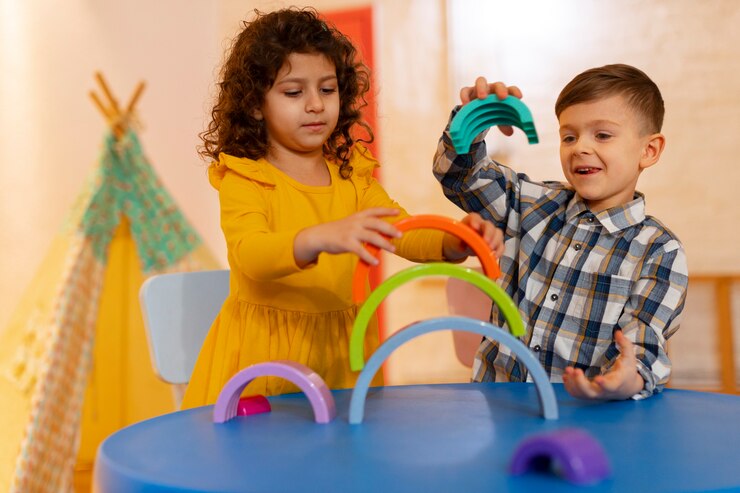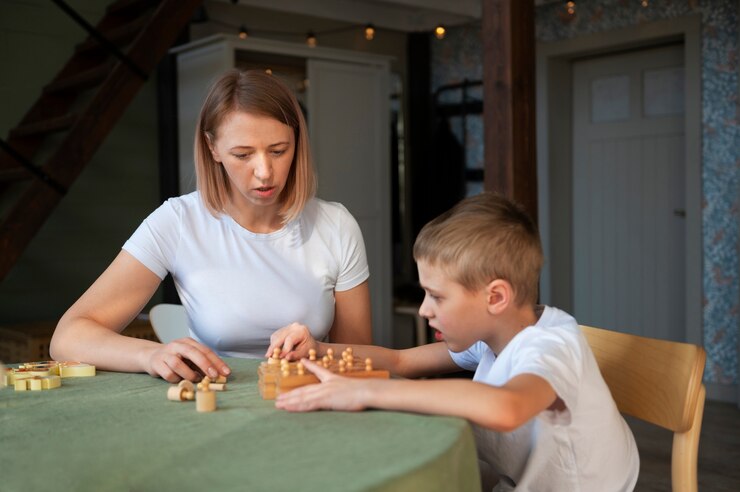
Raising a child with autism comes with a unique set of challenges and joys. Each day presents new opportunities for growth, connection, and understanding, and one of the most powerful tools in nurturing this development is inclusive play. Providing children with opportunities to engage in inclusive play and social activities is crucial for their growth, as these experiences help them build essential social skills, foster communication, and enhance emotional development.
In essence, play can be defined as a gratifying physical or mental activity that enhances a child’s skills, including negotiation, problem-solving, manual dexterity, sharing, decision-making, and teamwork. It positively impacts all areas, structures, and functions of the brain.
However, children diagnosed with autism spectrum disorder (ASD) often face challenges in adaptive behavior and response as well as social interaction, which can significantly impair or deter their ability to play.
Aligning with this, play therapy aims to honor the unique mental abilities and developmental levels of children with autism – its primary goal is to alleviate or resolve psychosocial difficulties and promote healthy growth and development.
The Importance of Inclusive Play in Children with ASD
Inclusive play refers to activities designed to be accessible and engaging for children of all abilities, allowing them to play together in a supportive environment. For children on the spectrum, inclusive play is essential as it provides a natural setting for learning and practicing social interactions, which may otherwise be challenging.
Engaging in inclusive play also helps neurodivergent children develop vital social skills, such as taking turns, sharing, and cooperating with peers. In addition to enhancing their communication abilities, both verbal and non-verbal, it also supports emotional development by helping them understand and express their feelings.
Promoting Social Opportunities – Practical Tips & Insights
Creating and encouraging inclusive play environments can be a rewarding experience for both parents as well as children. Here are some practical tips to foster inclusive play and social opportunities:
- Community Playgrounds: Playgrounds designed with inclusive equipment and spaces play an essential role in encouraging interaction among all children. Features like wheelchair-accessible swings, sensory play panels, and wide pathways can make playgrounds welcoming for children with various abilities. Such environments not only support physical activity but also provide opportunities for social interactions, helping children with autism learn to navigate and enjoy communal play spaces.
- Sensory-Friendly Events: Events tailored to children with sensory sensitivities, such as sensory-friendly movie screenings or museum days, often feature adjusted lighting, sound levels, and a more relaxed atmosphere to accommodate sensory needs. Actively engaging in these events allows children with autism to enjoy activities that might otherwise be overwhelming, and they offer a chance to socialize in a comfortable and understanding environment.
- Inclusive Sports Programs: Sports programs that emphasize teamwork and accommodate different abilities, like inclusive soccer or swimming classes, are designed to be adaptable, ensuring that all children, regardless of their skill level, can participate and benefit. Coaches and instructors in inclusive sports programs are typically trained to understand and support the needs of children with autism, creating a positive and encouraging environment that promotes physical fitness and social engagement.
- Playdates with Peers: Arrange playdates with children who are understanding and patient, facilitating a comfortable environment for your child to interact and build friendships. Start with short, structured activities that your child enjoys and gradually extend the duration as they become more comfortable. These playdates can be held at familiar and sensory-friendly locations, such as your home or a quiet park, to minimize anxiety and maximize enjoyment.
- Inclusive Arts and Crafts Classes: Look for arts and crafts classes that welcome children of all abilities. These classes can provide a creative outlet and an opportunity for social interaction. Activities such as painting, sculpting, or crafting can be highly engaging and offer a way for children with ASD to express themselves while working alongside their peers in a supportive setting.
- Library Programs: Many libraries offer inclusive story times or sensory-friendly reading sessions, which can be both online and in-person. These programs often feature interactive storytelling, sensory activities, and social opportunities designed to accommodate children with autism. Libraries can also be a great resource for both educational and social activities, providing a calm and structured environment for learning and interaction.
By incorporating these tips into your routine, you can help create enriching social opportunities for your child, supporting their development and fostering meaningful connections with others.
What Do the Experts Say?
Experts also agree on the significance of inclusive play in the development of children with autism. According to a 2023 study, play therapy can help children with autism express themselves through preferred activities, shifting from unwanted behaviors to non-injurious expressive behaviors. Play therapy also provides children with the opportunity to explore various interaction styles. Since each child with autism is unique and responds differently, interventions like play therapy can be tailored to meet their individual needs.
Statistics further support this, showing that children with autism who engage in inclusive play are more likely to develop stronger social skills and have better peer relationships compared to those who do not have these opportunities.
Resources and Support
For parents seeking to promote inclusive play and social opportunities, numerous resources are available. Local inclusive playgroups, online support communities, and educational materials can provide valuable guidance.
At Early Autism Services (EAS), we are dedicated to delivering high-quality Applied Behavior Analysis (ABA) therapy tailored to the needs of children with autism. Our services encompass a wide range of therapies, such as In-Home ABA Therapy, Center-Based ABA Therapy, Telehealth, Occupational Therapy, Speech and Language Therapy, Social Skills Groups, and Parent Training.
What sets EAS apart is our commitment to a personalized approach. We recognize that each child has unique needs and strengths, and our therapy programs are customized to address these individual differences, ensuring that each child receives the care and support they need to thrive.
At Early Autism Services, we are committed to providing personalized support and therapy to help each child reach their full potential.
If you’re interested in learning more about our personalized therapy programs, we encourage you to schedule a consultation with EAS today. Together, we can create a supportive and inclusive environment for every child to thrive. So, get in touch today via phone or WhatsApp and let’s get started






Recent Comments